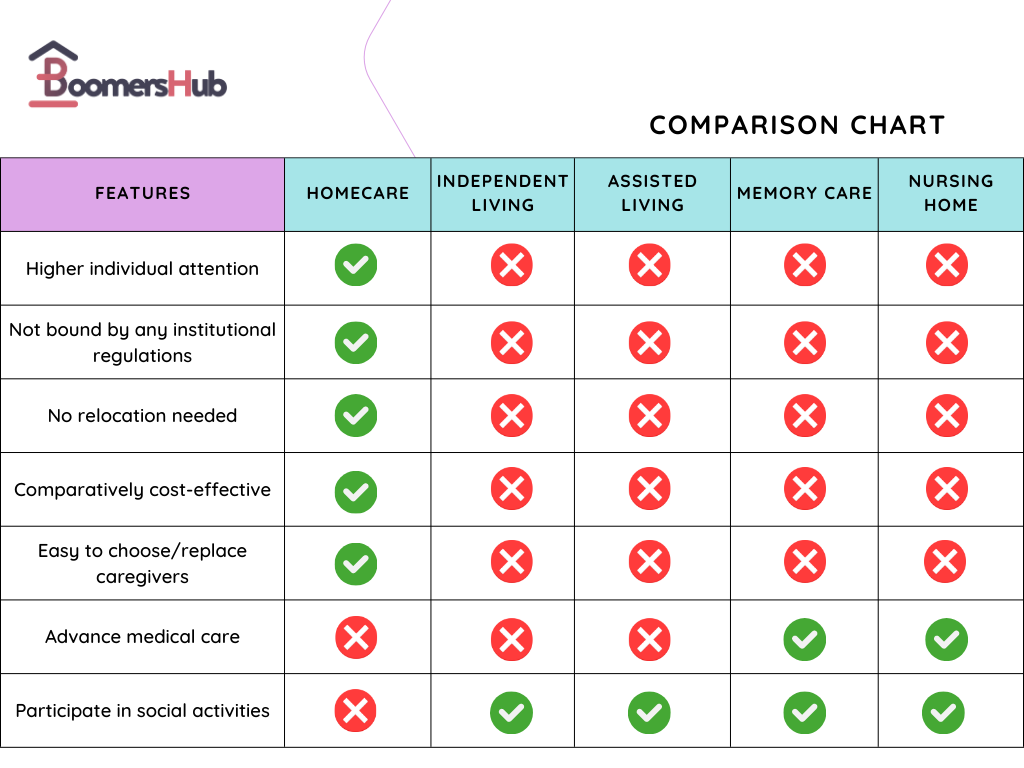As our loved ones age, they may require additional care and support to maintain their quality of life. Though many different types of senior care are available, homecare is often the preferred option for many seniors as it allows them to remain in the comfort of their homes while getting the necessary assistance with daily activities.
However, home care may not always be the best fit, especially for older adults with health complications or needing advanced medical attention. In this blog post, we’ll explore some homecare alternatives available to help you make the best decision for your elderly loved one.
When homecare isn’t enough
Homecare involves providing care to individuals in the comfort of their own homes. It is an increasingly popular option for seniors who prefer to age in place but require assistance with activities of daily living. While these care services have many advantages, there are some drawbacks too.
For example, it can be challenging for family members to balance caregiving responsibilities with their own work and personal commitments. Finding and hiring reliable and trustworthy home health aides can also be challenging. Furthermore, home care may not be suitable for individuals with complex medical conditions or requiring 24-hour supervision.
Depending on individual needs and preferences, you might have to look for other senior care options to ensure the best care possible for your senior loved one and reduce your caregiving stress.
What are the homecare alternatives?
Most people prefer to remain in their own homes for as long as possible, but due to age and health conditions, they have to look for outside support at some point. Thankfully, there are several alternate solutions for homecare to meet everyone’s unique needs and preferences. These include:
Homecare vs Independent Living
Independent living facilities, also known as retirement communities or senior apartments, are housing options specifically designed for older adults who are still able to live independently but require some assistance with daily tasks. It is an ideal alternative to homecare. These facilities offer a range of services and amenities, including housekeeping, transportation, meal preparation, and social activities. They also typically have staff available 24/7 to provide assistance as needed.
Independent living facilities can vary in size and layout, from small apartments to larger communities with multiple buildings. Some facilities may also offer specialized care for seniors with specific medical needs, such as memory care for those with dementia or Alzheimer’s.
Homecare vs Assisted Living
Assisted living facilities are a popular choice for seniors requiring a higher level of care than can be provided in their homes. These facilities provide various services, including preparing meals, housekeeping, transportation, and medication management. They also offer a variety of social activities, such as games, exercise classes, and outings. Assisted living facilities are designed to promote independence and provide support where needed.
One of the benefits of assisted living is that it provides a social environment for seniors. It can be vital for those living alone or with limited mobility. Assisted living facilities also offer a secure environment with staff available 24/7 to provide assistance when needed. However, assisted living usually costs more compared to home care services.
Also, when considering an assisted living facility, visiting in person and speaking with staff and residents is essential. Look for a facility that feels like home and offers necessary services and amenities to your loved one.
Homecare vs Memory Care
Homecare services may not be enough to support elderly people with progressive memory loss or reduced cognitive abilities. In this situation, moving to a memory care facility could be a timely decision. Memory care is a specialized type of senior living that caters to individuals with memory loss. Staff in memory care communities are highly trained in caring for individuals with dementia and Alzheimer’s and are equipped to handle the unique challenges of these conditions.
Memory care facilities typically offer a range of services, including medication management, assistance with daily living activities, and specialized therapy programs. In addition to these services, they also provide a range of activities designed to promote mental and physical stimulation. These activities include crafts and art therapy, speech therapy, and exercise classes.
One of the primary benefits of memory care is being surrounded by others who are going through similar experiences. This sense of community can be incredibly comforting for both residents and their families, as they can share their experiences and learn from one another.
Homecare vs Nursing Home
Nursing homes are another alternate solution for homecare for seniors who require round-the-clock medical care and supervision. These facilities provide skilled nursing care, as well as rehabilitation services and assistance with activities of daily living. Nursing homes may also offer specialized care for seniors with dementia or other medical conditions.
One of the advantages of nursing homes is that they provide a high level of medical care and attention. They also offer a structured environment with staff available around the clock. However, nursing homes can be expensive, have an institutional feel, and may not offer the same level of independence as other care options.
When considering a nursing home, visiting in person and speaking with staff and residents is important. Look for a facility that provides the level of medical care and attention your loved one requires and feels comfortable and welcoming.
Homecare vs other senior care options
The chart below will help you understand the pros and cons of alternative care services compared to home care.

Homecare alternatives
Final thoughts
When it comes to senior care, there are many options available. Each option has its benefits and drawbacks, and choosing the one that best meets your loved one’s needs is important. Assisted living facilities, independent living, nursing homes, and memory care are all viable home care alternatives that can provide the support and care your loved one requires.
Ultimately, the most important thing is to prioritize your loved one’s comfort, safety, and well-being. Whether you opt for homecare or one of the alternative options discussed in this article, be sure to do your research, speak with professionals, and make an informed decision that works for everyone involved.
Related articles:
- Home Health Care: How Does It Differ from Home Care?
- What home health services are covered by Medicare?
- Dementia Home Care: Meaning & Importance
FAQs
- What is it called when a nurse takes care of you at home?
When a nurse takes care of you at home, it is called home health care. It is a valuable service that provides medical care and support in the comfort of your own home. Whether you need help managing a chronic condition, recovering from surgery, or simply need assistance with daily tasks.
- Is it better to be cared for at home?
Many people believe that receiving care at home is better than being cared for in a hospital or nursing home. There are several reasons for this:
- Home care allows patients to remain in a familiar environment, reducing stress and promoting healing.
- Patients who receive care at home can often maintain greater independence.
- Home care can be more personalized and tailored to the patient’s specific needs.
- Home care is often less expensive than hospital or nursing home care.
Of course, home care is not always possible or appropriate for every patient. Some patients require round-the-clock medical attention or specialized equipment that can only be found in a hospital or nursing home. It’s important to consult with a healthcare professional to determine the best course of care for each individual patient.

